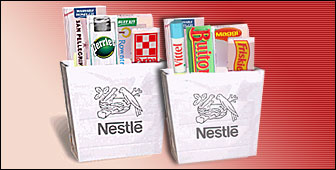Nestlé’s empire strikes again

Nestlé is continuing its strategy of growing globally with its planned acquisition of frozen snack group Chef America. However, it's a move that is not to everyone's taste.
The number one food concern announced on Tuesday that it was continuing its aggressive expansion policy in the United States with the takeover of Chef America for $2.6 billion (SFr3.86 billion).
Only last week, the company was reported to be a hot favourite to buy US chocolate maker Hershey for a price of around $12 billion.
“Chef America represents a particular segment of the frozen food business that Nestlé was not in so far, neither in the US nor elsewhere,” Nestlé spokesman François-Xavier Perroud told swissinfo.
Market leader
“Chef America is market leader. It’s developed a very successful, fast-growing high margin business and it controls 50 per cent of the market. That is plenty of attractiveness,” he added.
Analyst Jérôme Schupp at the private bankSyz in Geneva commented that the price for Chef America was somewhat on the “high side”.
“Nestlé is not giving out any figures on the profitability of the company but it must be high if you look at the size of the deal,” he said.
Reasonable price
Research analyst Clare Memory at Barclays in London agreed that the price was “rather full”. “But we understand that Chef America is a high margin business and given its growth rate, we believe the sum is reasonable,” she told swissinfo.
Nestlé spokesman Perroud told swissinfo that the price was a “great philosophical” discussion.
“Look it another way. With the tax benefits that we’re getting, we are acquiring a $720 million business for roughly $2 billion, that’s roughly three times annual sales,” he said.
“If you compare that with [other] acquisitions made in the food industry lately, that is a very good ratio, especially since you are talking about a fast-growing and very profitable business so we don’t think we’ve overpaid for that acquisition.
Andreas Missbach, a financial expert at the Berne Declaration lobby group for more equitable North-South relations, told swissinfo that the Chef America acquisition was another sign of Nestlé expansion as THE globalised powerhouse.
Shortcomings
However, he warned that there were shortcomings in the global growth movement.
“Fundamentally there is a trend in such acquisition strategies that there are fewer and fewer competitors operating in the same markets,” he said.
“There’s a danger that with only a few players, they will come to illegal price agreements with each other. The competition authorities must therefore be very wary,” he said.
String of acquisitions
Nestlé, which has its headquarters in Vevey, has made a string of notable acquisitions over the past two decades, buying brands such as Ralston Purina and Spillers (pet food), San Pellegrino and Perrier (mineral water), Rowntree (chocolate), Buitoni and Carnation.
The company, which had sales of SFr84.7 billion in 2001, made a net profit of almost SFr6.7 billion.
Analyst Clare Memory said that Nestlé’s recipe for success could be explained by its move from being a fairly large, slow-moving food company into a group which could boast some of the best top and bottom line growth in its sector.
“I think it’s key to success has been moving into fast-growing categories and markets. Its move into water in the 1990s, also into pet food with the acquisition of Ralston Purina and further expansion into the ice cream business are all good examples,” she said.
“It was also one of the first food companies to move into the emerging markets and whilst emerging markets are currently showing signs of weakness, particularly at present in Latin America, they certainly offer growth for those products which have become more mature in the industrialised countries,” she added.
Nestlé spokesman Perroud explained the success recipe more succinctly. “I think basically it is a long-term view, a willingness to run entrepreneurial risk when you believe it is justified and an above-board, straightforward way of doing business,” he said.
by Robert Brookes

In compliance with the JTI standards
More: SWI swissinfo.ch certified by the Journalism Trust Initiative
You can find an overview of ongoing debates with our journalists here. Please join us!
If you want to start a conversation about a topic raised in this article or want to report factual errors, email us at english@swissinfo.ch.